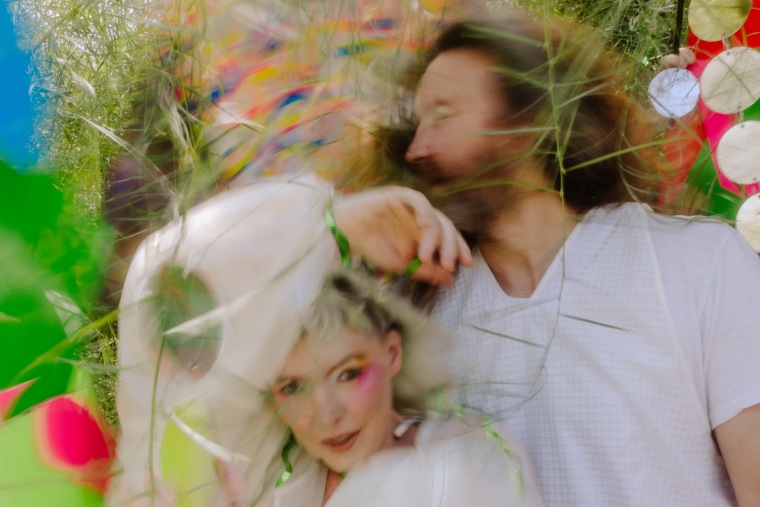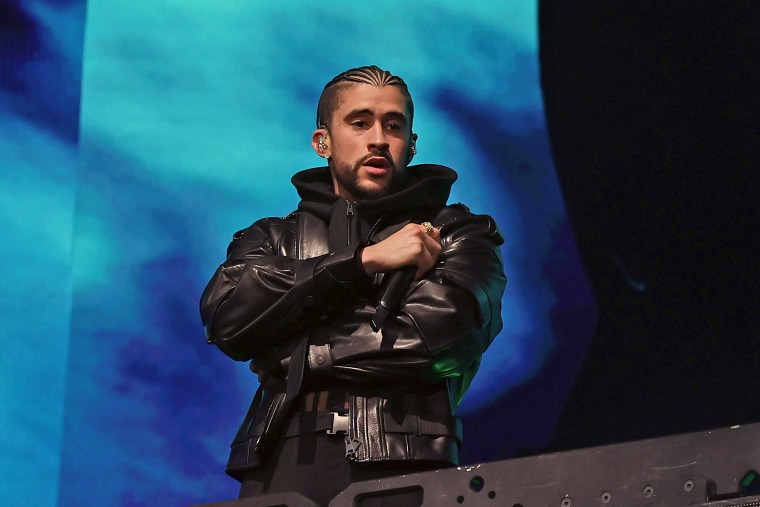Courtesy of Wolf Alice
Joel Amey of Wolf Alice wants to clear the air.
A few months ago, while doing promo with The Guardian for the band’s new album, The Clearing, the drummer made a gaff that he says was taken out of context. While being asked about the future of the band and if they see it going on forever, he responded by saying how lucky they were to still be touring while so many of the bands that inspired him hadn’t made it through the climate of the last couple of years.
“And it just said, ‘Our peers are gone,’” he moans on a recent afternoon, recounting the article’s perhaps overly indulgent headline. “I sound like an arrogant dick in that quote! I was trying to say how lucky we are with how expensive it is to be in a band, like we still tour in America…”
Amey’s embarrassment aside, there is truth in the observation of how rare it is that a band like Wolf Alice is thriving right now. Since breaking out in the late 2010s with the dreamy hit “Don’t Delete The Kisses,” the London four-piece has only seen an exponential rise, netting them a Mercury Prize and nearly annual primetime slots at festivals like Glastonbury and Primavera Sound. Pivotal releases like 2021’s moody, critically-acclaimed masterpiece Blue Weekend, and now The Clearing, their lushly ornate take on ‘70s Laurel-Canyon pop, have only widened their audience which now treats them more like a legacy act. Songs like “The Sofa” and “Bloom Baby Bloom,” two ecstatic singles from the latest project, easily explain why: their cinematic anthems make you feel big feelings while sending chills down your spine.
Wolf Alice is easily at the height of their powers, but one gets the sense that’s not something they dwell on much. Squeezed together on a couch in their Brooklyn hotel room, they amiably answer my questions, always downplaying their thoughts with a self-deprecating joke. The new record is their first on a major, Columbia Records via Sony, and was their first time working with big-time producer Greg Kurstin (Adele, Lily Allen, Beck, Miley Cyrus) but they deny it was in a “trying to be more pop” way. “I get that he’s worked with big pop stars, but one of the things that drew us to him was the range of things that he’s done and who he’s worked with,” frontwoman Ellie Rowsell says.
Ahead, the band talks following up a successful album, why they love Greg Kurstin, and the state of rock music today.

Courtesy of Wolf Alice
The FADER: This is your first project with Columbia. Anything different from working with a major versus Dirty Hit?
Theo Ellis: Loads of people. It’s a big old company. That’s one of the benefits, you get to go and meet people who work specifically in that place. It feels like our music is able to be pushed globally more than probably it ever has up until now. But we love those people at Dirty Hit.
I always feel like this subject could be a bone of contention, but it’s not. We signed for three albums and we finished that and we just wanted to try a new experience and the Sony thing came up… We’ve been on RCA in America since we began, that’s not actually anything new to us, but you’re right, it does [change things]. I do feel like this is an exciting time for us. Sometimes we’ve had a lot of trepidation before we come out. This time we’re probably the happiest with the work we’ve made. What will happen is that we’re excited about it then everyone hates it. It’ll be the other way around.
Probably not, but that’s very valid to be worried, following up a very successful record. Was there a certain mental approach that you guys took approaching this album?
Ellie Rowsell: I think the hard bit is almost over because what you wanna do is surpass your own expectations or you wanna make something that you feel is, not necessarily better than what you did before, but satisfies your creative hunger and need for a new direction. As we’ve finished the record, we’re proud of it and everything else feels a little bit easier after that moment. I feel like it’s successful already because I like it.
Ellie, I wanna talk about “Play it Out.” You open it with this line, “When my body can no longer make a mother out of me.” Recently, a lot of female pop stars have started singing about motherhood. What prompted you to want to talk about this.
Rowsell: Well, I think we’re in different times where, I don’t know and this might be my echo chamber but, people are having children later or not at all. I had lots of conversations with a lot of mainly female friends, most of my friends are the same age as me and it’s maybe quite unusual that most of us are childrenless. There’s a quote in the song, “The hand that rocks the cradle is the hand that rules the world,” and it annoyed me because it was like, why is it so shocking one, that a woman might rule the world and two, why do we always only applaud women when they’re mothers? I felt like the only time I ever saw [people] big up their girlfriends was when they had a baby or something.
Did you feel that you could be speaking to a lot of women who might feel conflicted about motherhood?
Rowsell: I think I was speaking to myself. I’m not saying, oh I don’t want to have children. I’m saying if I don’t have children I’m still amazing.
It was interesting to see that you guys worked with Greg Kurstin because your songs have always leaned quite pop, but Greg’s worked with Adele, a lot of big stars. What was it like to be in the room with him? Did he illuminate anything new?
Rowsell: It’s weird because I know that he worked with Adele, but I didn’t realize people would be like, “Oh, you’re trying to be pop now because you’re working with Greg.” We first met him when he was working with Foo Fighters and they’re not pop. He can kind of do anything.
Joff Oddie: He’s a great facilitator, if you know what I mean, to coach you getting there and be that conduit [when you ask], “how do you make this sound like this or feel like this.”
Joel Amey: When you speak to him about the pop thing, he’s like, “It just happened.” His history is, he was in a punk band and then he was a jazz musician.
Ellis: I feel like he’s been typecast. I think he’s broader than people think he is.
Speaking of references, you all were inspired by a lot of ‘70s pop music, Fleetwood Mac, Steely Dan. What was your first memory of listening to these albums and these artists in a meaningful way?
Ellis: I don’t know about you guys, but I discovered a lot of this in my adult life. Stuff like Glenn Campbell and Townes Van Zandt, I discovered because we were leaning in a different direction.
Rowsell: It’s really interesting because all that stuff was like stuff that you learn at school. I was part of a community choir and we sang Glenn Campbell. We sang the Carpenters. All these songs were so ingrained in a totally different way of hearing music that [when] I heard it again for the first time, I took it seriously. I was hearing it in a different way as an adult. It feels like this time around [I] was interested in stuff that children like, or like why is it that choirs sing this song? I was interested in melody driven stuff and a lot of that stuff was really good in that era.
I’m not saying, oh I don’t want to have children. I’m saying if I don’t have children I’m still amazing. —Ellie Rowsell
What’s your opinion on the state of rock music today?
Amey: I think considering how hard it is, it’s healthy. I think it’s admirable how many bands I can still find that I hadn’t heard of yesterday. I’m feeling quite inspired actually when I listen to stuff at the moment.
Rowsell: It’s really hard to be in a band. It’s extremely expensive and even if you’re backed by a label, people don’t know that you’ve got to split everything. People love band history, just look at Oasis. [But] that’s not gonna happen anymore unless people invest in bands.
Ellis: Everything you have to do to make the initial investment is enormously more expensive than it used to be. It’s so much harder to be in a band or to try and start a band now. I remember watching the Meet Me in the Bathroom documentary and they were mourning the fact that Brooklyn was no longer affordable. Where have people gone? Philly?
That’s a good question. A lot of people I know are moving to Philly. People from Philly are also moving here. I don’t know, we somehow make it work.
Ellis: The problem is though, people still make it work. I don’t know about here, but it feels like the problem is that if you have that kind of environment, it will only be privileged people that will make it work. And that kind of sucks for everyone.





